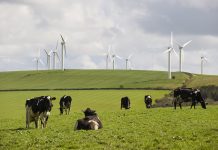Fury from environmental and green energy groups greeted prime minister Rishi Sunak’s announcement today that the government will press ahead in defiance of its legally-binding climate obligations, with mass grants in September of oil & gas extraction licences in the North Sea.
Last year Sunak’s government approved the Cambo field, off Shetland.
The prime minister’s package was seen by environmental observers as a stepping up of the Conservatives’ pre-election ‘culture wars’, in defiance of both climate science and of legal obligations under the internationally binding 2009 Climate Act.
Energy minster Andrew Bowie, an Aberdeenshire MP, told Radio 4’s Today programme that the government was happy to “max out” the nation’s hydrocarbon resources, in the interest of curbing consumers’ bills, and cutting the UK’s reliance on Vladimir Putin’s energy.
“The Prime Minister today will confirm the grant of over a hundreds of new licences for the North Sea, with more to come in future.
“This is about maxxing out our oil and gas reserves in the North Sea. It means we will be more resilient in supplying our own baseload
The independent Climate Change Committee recognised, the nuclear minister went on, that fossil fuels would play an important role in national energy demand for many years to come. So it was important that as much energy as possible should come from British waters, processed by British workers and with revenues coming to the British exchequer.
“The Prime Minister today is conducting a greenwashing of the fossil fuel sector”, Greenpeace chief scientific officer Doug Parr told BBC radio. “He’s assisting in a PR campaign designed to persuade people that these initiatives are environmentally friendly when clearly they’re not.”
Home upgrades of energy efficiency, boosting EV charging infrastructure and improving planning regimes governing renewable generators’ access to the national grid, were all bigger claims on the Prime Minister’s time, Parr said.
Major offshore wind power generators feature among the membership of the Renewable Energy Association.
“If the Government are serious about delivering energy security while reaching Net Zero in a pragmatic way” argued REA chief executive Dr Nina Skorupska, “then they should be accelerating the cheapest forms of energy.
“This means low carbon projects that are unaffected by changes in the volatile fossil energy markets, the cause of both increased energy costs and security concerns.
“Instead, today, the government is supporting new fossil fuel exploration, at the same time as the US Inflation Reduction Act and the UK Government’s Electricity Generator Levy, a windfall tax on renewables, are seeing the UK attractiveness for low carbon investment diminish.
“Real energy security will be delivered” said the REA boss, “by reinforcing our grid systems and sorting out planning delays so that low carbon generation can be built quickly.
“The development of CCUS should also be targeted at bioenergy applications, not capturing carbon that should stay in the ground. Bioenergy with carbon capture and storage delivers critical negative emissions recognised as essential for getting to net zero.”
Earlier alongside hydrocarbons regulator OEUK, Sunak had confirmed to his audience in Scotland’s oil capital that projects Acorn in North East Scotland and Viking in the Humber have been chosen as Britain’s third and fourth CCUS clusters. They are planned for 2030.
Whitehall last year committed to deploy by the mid-2020s CCUS in two English locations – the HyNet cluster on Meseryside & north Wales and the East Coast Cluster, spread between Teesside and the Humber.
Together, the four clusters could support up to 50,000 British CCUS jobs by 2030, ministers advised.




